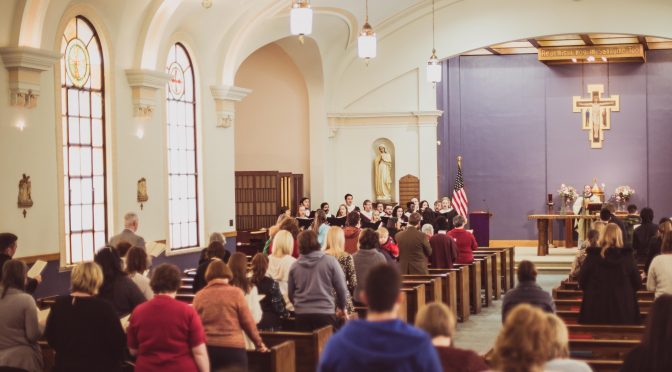Below is the Cardinal Newman Mass homily as delivered by Father John Fogliasso, university chaplain, Feb. 21, 2018.
Welcome to the annual Cardinal Newman Mass. It is great to see so many students, staff, faculty and members of administration coming together to pray for this community, as well as to reflect upon what we might learn from the life of the man for whom our university is named.
I would like to start by sharing a line from the homily given by Pope Emeritus Benedict XVI at the Mass of Beatification of Venerable Cardinal John Henry Newman in 2010. The Holy Father said this regarding Cardinal Newman’s contribution to the ethos of educational institutions, but most especially of higher education; “Firmly opposed to any reductive or utilitarian approach, he sought to achieve an educational environment in which intellectual training, moral discipline and religious commitment would come together.”
Intellectual training, moral discipline, and religious commitment — three characteristics of a learning environment offering a comprehensive liberal education; three characteristics I believe Newman successfully realizes.
First, intellectual training. Of course we know that the fundamental reason students choose to attend Newman is for the outstanding education they receive, one that will give them the skills to become successful in whatever career they have chosen to pursue. For this, we are grateful to our many fine professors that spend hours on end preparing lessons and grading those hated assessments; quizzes, papers and tests. Saint Pope John Paul II once said, “Faith and reason are like two wings on which the human spirit rises to the contemplation of truth; and God has placed in the human heart a desire to know the truth — in a word, to know himself — so that, by knowing and loving God, men and women may also come to the fullness of truth about themselves.”
In the classroom, our students are given the tools to discover the truth about any number of things, but most especially to consider their purpose in the world. Once again, returning to Cardinal Newman, he reminds us that God “has not created me for naught. I shall do good; I shall do his work; I shall be an angel of peace, a preacher of truth in my own place.”
Students, as you continue your studies know that God has given you a purpose also and that the skills you acquire at Newman will help you to achieve that purpose.
Second, moral discipline. An aspect of Newman’s culture that is readily evident is the culture of service that pervades every department, office and building on this campus. The staff at Newman is incredible in providing an abundance of opportunities to serve others, and in serving others to be reminded of how blessed each of us is. During those moments, we are tempted to complain about how difficult life is, how busy we are or how we have to work too many hours or jobs. It’s during those moments that we can recall the last time we served a meal at the Lord’s Diner, went on the annual service trip to Crownpoint or even just helped a classmate who was struggling stay caught up in a class.
This culture of service will have a lasting impact not only on the students but also on everyone who comes in contact with Newman, which is why we have so many generous benefactors that didn’t necessarily attend Newman but have bought into the mission.
Finally, religious commitment. Of course, we get our commitment from the founding order of Newman, the Congregation of the Sisters Adorers of the Blood of Christ. These dedicated religious sisters continue the mission passed on from their foundress, St. Maria de Mattias, who was, according once again to Saint Pope John Paul II, “a joyful commitment to save ‘the dear neighbor’ from ignorance regarding the mystery of God’s love for humanity.”
Above all else this is the purpose of Newman University — to make God’s love known by showing a true concern for the cura personalis, a true concern for the care for the entire person.
In the readings today, we hear the concern that God has for His creation, for all humanity. When the people of Ninevah were engaged in grave sin, He sent Jonah to warn them of their evil ways and the need for repentance, and God continued to show His care for humanity when He sent His only Son to take on flesh and once again warn people of the need for repentance from their sins — to accept his saving message, a message of peace, mercy and above all love for our neighbors.
In the three previously described characteristics of Newman — intellectual training, moral discipline and religious commitment — we are all being prepared and sent to do the same; to witness to God’s peace, mercy and love.
As we continue our Lenten journey, recognizing that each of us is on individual paths of conversion and repentance, may we do so with joy that others may be led to Christ through our example! And as we continue this Eucharistic celebration and prepare to receive Christ’s Body, Blood, Soul and Divinity under the appearance of bread and wine, we pray in gratitude for having been led to this institution and commit ourselves to doing all we can to contribute to its success so that future generations may continue to experience the transformative experience that comes from being a member of the Newman University community.
Amen.


